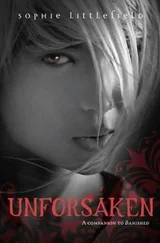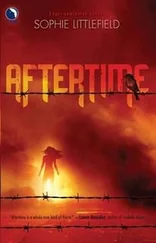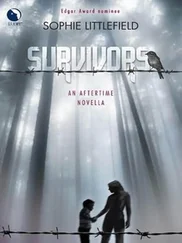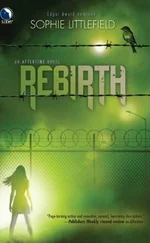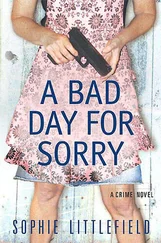“...can offer you tea, if you like, Inspector,” Patty heard her mother say clearly as they passed, and then the voices became indistinguishable again.
Inspector? Patty untangled the sheets from her legs and sat up in bed, rubbing her face. Why would a detective be visiting her mother’s house? She pulled on the nylon running shorts she’d tossed on a chair the night before and was halfway to the door before she changed her mind and went back for her bra. It took a little searching—the bra had disappeared halfway under the bed—but Patty eventually found it and yanked it on, then exchanged the T-shirt she had been sleeping in for a fresh one from the suitcase on the floor. She sniffed under her armpits—not terrible. She really needed to unpack. She’d moved out of her apartment last week and she was staying here with her mother until the wedding, but it was only her third day off and she was still enjoying being lazy.
She peeked out the bedroom door, craning her neck to peer into the kitchen, and saw a man’s polished brown shoe under the kitchen table. The rest of him was just out of sight. Patty grimaced and tiptoed across the hall to the bathroom. She washed her face and brushed her teeth in record time, pulling a comb through her hair and settling for a quick swipe of lip gloss.
When she entered the kitchen, she was feeling presentable, if self-conscious about her bare legs. The man stood and greeted her with a nod.
“Patty,” her mother said. “This is Inspector Torre.”
“Pleased to meet you.”
“You too,” Patty said automatically, taking the hand he offered, finding his grip surprisingly tentative. He was at least six, six-one, with the sort of beard that looks untended by lunchtime and thick, black sideburns encroaching on his jaw. Handsome, some women would no doubt think.
“I’m here to talk to your mother about the death of an acquaintance of hers.”
“Who?” Patty quickly cataloged everyone in her mother’s circle, a very short list. Besides work, Lucy Takeda went almost nowhere.
“Reginald Forrest. He was the proprietor of a commercial gym in the basement of the DeSoto Hotel.”
Patty knew the hotel—a once-grand stone edifice about a quarter mile away, on Pine or Bush or one of those streets. A pocket of the neighborhood that had seen the last of its glory days. But she had never heard the man’s name.
Lucy tsked dismissively. “Someone I knew a long time ago, in Manzanar. I haven’t seen him in thirty-five years.”
“But—” Patty looked from the inspector to her mother, confused. Lucy never spoke about her time in the internment camp. “Why on earth would you want to talk to my mother?”
Torre cleared his throat, looking slightly uncomfortable. “Someone claims to have seen someone resembling your mother in the vicinity of the gym around the time he died. We’ve got a time of death between five and seven yesterday morning, and this person places your mother there between seven and seven-fifteen.”
“But that’s—” Patty struggled to clear the morning haze from her thoughts. “My mom doesn’t ever go over there.”
“This person said...” Inspector Torre seemed to be searching for the right words. “That is to say, he described certain characteristics.... We asked around the neighborhood and several people mentioned Mrs. Takeda.”
Now Patty understood his discomfort. “Characteristics...” Yes, people didn’t quickly forget her mother’s face. The pocked and shiny pink scars took up most of the right side of her face, extending from her right eye down to her jawline. They encroached upon her lower eyelid, pink and puffed and vertically clefted; the eye itself was milky and gave the impression of both blindness and acute vision, which was unsettling and put the observer in the uncomfortable position of having to find another place to focus his own eyes.
“The inspector talked to Dave Navarro,” Lucy said indignantly. “And the Cooks!”
The faint beginning of a headache stirred between Patty’s temples. Her mother had never had a great relationship with the neighbors—she could only imagine how those conversations went. “I’m sorry, but this is, well, I don’t get it,” Patty said. “I mean, you weren’t at the hotel yesterday morning, were you, Mom?”
“Of course not. And besides, Inspector Torre said it could also be a suicide,” Lucy said. “It probably was.”
“Why would you say that?” Torre asked.
“You said that. You said the stun gun or whatever it was—”
“Captive bolt pistol,” Inspector Torre said. “Often used with livestock, but it has other uses. What I meant was, was there something about Mr. Forrest that makes you think he might have been suicidal?”
“How would I know?” Mrs. Takeda asked. “Reginald Forrest is an old man now. I’m sure he had his reasons.”
“Was,” Torre interjected. “Was an old man.”
Lucy shrugged. She was in an odd mood, both irritable and nervous, Patty thought. “Wait,” she said. “Can you just back up a little for me, Inspector? I’m sorry... I haven’t had my coffee. I’m not sure I’m following what you’re saying.”
Lucy frowned, an expression that distorted her scars, and folded her arms over her chest.
“Sure.” Torre reached for a notebook in his breast pocket, licked his thumb and started turning pages. “Janitor was buffing the lobby floor at about seven, seven-fifteen yesterday morning,” he said. “He described you pretty accurately. Said you appeared flustered, that you were walking faster than normal.”
“He doesn’t know me,” Lucy said. “How does he know how fast I walk?”
“Mother. Please.”
“Your mother’s neighbors, Mr. David Navarro and Cindy and Tom Cook, did say that she takes frequent walks around the neighborhood.”
“How would they know where I walk? They’re not my friends,” Lucy said. “They’ve never liked me. Dave Navarro had a tree whose roots were choking the sewage pipes under my house, and we argued over it until he finally cut it down. And the Cooks have a daughter who spreads her legs for every boy who comes around.”
“Surely my mother isn’t the only person you’re interviewing,” Patty said hastily, painfully aware of how caustic Lucy could sound to someone who didn’t know her. She was a loner, but that certainly didn’t mean she’d killed anyone, a point Patty feared might be lost on Torre.
He shrugged. “Sure, we’ve got a few people we’re talking to. Forrest had a son from a first marriage—he’s disturbed or retarded or something, lives in a group home. There’s also a girlfriend. I don’t suppose you can tell me anything about either of them.”
“Of course not,” Lucy snapped. Patty tried to telegraph be nice. “I told you I haven’t talked to him in three decades.”
“All right.” Torre tucked the notebook back in his pocket. “Here’s what I’m going to do. I’m going to give you a chance to think about Forrest, see if you remember anything that might help us out.”
“From thirty years ago?” Damn, now she was doing it too—Patty instantly regretted snapping.
Torre turned his gaze on her. “So you live here with your mother, Patty?”
Patty resisted the urge to glare. “Only for a couple of weeks. I’m getting married. The wedding’s on the seventeenth.”
“Oh. Well, in that case, congratulations.”
He stood and adjusted his jacket, his eyes traveling up to the shelf that ran the length of the wall separating the kitchen from the dining room, and Patty cringed inwardly. This was the moment that marked every newcomer’s first visit to the house, the moment Patty had learned to dread so much that eventually she’d stopped bringing friends home at all.
Читать дальше



